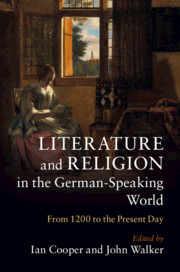Book contents
- Literature and Religion in the German-Speaking World
- Literature and Religion in the German-Speaking World
- Copyright page
- Contents
- Figures
- Contributors
- Introduction
- Chapter 1 Pagan, Christian, Secular
- Chapter 2 Literature and Religion in the Holy Roman Empire 1450–1700
- Chapter 3 German Literature and Religion 1700–1770
- Chapter 4 Literature and Religion in Germany 1770–1830
- Chapter 5 Culture, Society and Secularization
- Chapter 6 Religion in German Modernism 1900–1945
- Chapter 7 German Literature and Religion 1945 to the Present Day
- Notes
- Bibliography
- Index
Chapter 6 - Religion in German Modernism 1900–1945
Published online by Cambridge University Press: 14 September 2019
- Literature and Religion in the German-Speaking World
- Literature and Religion in the German-Speaking World
- Copyright page
- Contents
- Figures
- Contributors
- Introduction
- Chapter 1 Pagan, Christian, Secular
- Chapter 2 Literature and Religion in the Holy Roman Empire 1450–1700
- Chapter 3 German Literature and Religion 1700–1770
- Chapter 4 Literature and Religion in Germany 1770–1830
- Chapter 5 Culture, Society and Secularization
- Chapter 6 Religion in German Modernism 1900–1945
- Chapter 7 German Literature and Religion 1945 to the Present Day
- Notes
- Bibliography
- Index
Summary
This chapter explores the presence of religious narratives and traditions in Modernist literature, arguing that it shapes both what authors write about and how they write. Drawing on texts by Trakl, Rilke, Brecht, Musil, Thomas Mann, Wolfenstein, Kafka and Sachs, the chapter explores the wide range of attitudes both towards established religion (Christianity and Judaism) and alternative forms of spirituality (occultism and spiritualism). For all their differences, Modernist authors focus on a set of recurring concerns: the tension between tradition and modernity; the relationship between self and God, and between self and other; the changing role of community; and existential experiences such as suffering, persecution and death. In times of war, social change and political upheaval, the relationship between literature and religion remains mutually productive. Modernist texts reflect the crisis of established religious traditions, but literature is also an active agent, a site where old and new attitudes towards spiritual matters can be explored.
- Type
- Chapter
- Information
- Literature and Religion in the German-Speaking WorldFrom 1200 to the Present Day, pp. 204 - 243Publisher: Cambridge University PressPrint publication year: 2019

